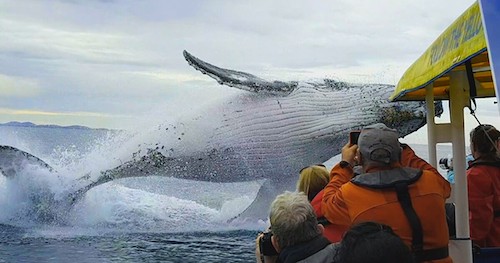In September 2015, a 30-ton humpback whale breached and just missed landing on wildlife filmmaker Tom Mustill and his friend Charlotte Kinloch as they kayaked in Monterey Bay, California. Both survived the incident, but the traumatic experience haunted Mustill (Nature – Giraffes: Africa’s Gentle Giants) and left him wondering if the whale was deliberately trying to hurt them or trying its best not to. To find the answer, Mustill returns to California to investigate, meeting with whale experts and those who have survived similar close encounters. What he discovers raises far bigger questions, not just about what happened that day, but also about humans’ relationship with whales and their future.
- Humpback whales have no teeth and their throats are only slightly larger than a human throat, making them only able to swallow smaller fish. As mammals, they also breathe air, give birth to live young and maintain a high body temperature.
- Inside a humpback’s pectoral fins are the biggest arms on the planet. Their big tail fins are called flukes, which can propel their 30-ton bodies into the air in what is known as a breach. In addition to breaches, there are four other types of whale splashes, although the meaning and significance of each splash type is not known.
- Monterey Bay is a massive whale feeding ground and has become one of the whale-watching centers of the world. Whales have made an incredible comeback considering humans killed around 3 million of them during the 20th century.
- Whales still face major threats from plastic and fishing gear entanglements and have been turning up injured or dead in record numbers, with a 300 percent increase in humpback entanglements alone in the last five years.
Buzzworthy Moments:
- Surviving his breaching accident led Tom Mustill to an obsession with humpback whales and a determination to discover why the whale, called “Prime Suspect,” seemingly attacked him. Viral videos of the accident from witnesses, a database of whale tail snapshots from hundreds of citizen scientists and scientific research aid his investigation. However, he soon learns that many humpback mysteries remain, including how long they live, total population and the purpose of their songs.
 During Mustill’s investigation, a dead fin whale is discovered and transported to an uninhabited island set up as the designated location for whale carcasses. Whale expert Dr. Joy Reidenberg helps perform a necropsy to understand what caused the death. She discovers that the whale was killed from an accidental impact with a ship.
During Mustill’s investigation, a dead fin whale is discovered and transported to an uninhabited island set up as the designated location for whale carcasses. Whale expert Dr. Joy Reidenberg helps perform a necropsy to understand what caused the death. She discovers that the whale was killed from an accidental impact with a ship.- In a never-before-filmed sequence, Mustill accompanies a group dedicated to disentangling whales as they undergo the dangerous process of trying to cut free a whale trapped by a rope while not harming themselves or the whale.
- There is some evidence that humpback whales exhibit altruistic behavior. In one viral video, we see a humpback tuck a diver under its fin to protect her from a shark and swim her to safety. Humpbacks are also the sworn enemies of killer whales, and in one scene they chase away a group of killer whales, appearing to protect a dead body of a gray whale calf that the killer whales just killed. Humpbacks have also been spotted coming to the rescue of seals, sea lions and dolphins.


